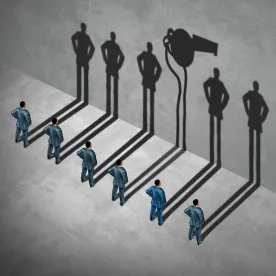Nearly 10 years after former employee Howard Wilkinson blew the whistle on Danske Bank, the U.S. Department of Justice (DOJ) and Securities and Exchange Commission (SEC) have issued over $2 billion in penalties against the multinational banking and financial services corporation.
On December 13, Danske Bank pled guilty and agreed to settle charges by U.S. authorities that the bank defrauded U.S. banks and misled investors about its customer base and anti-money laundering controls.
Howard Wilkinson, who served as a manager at the bank’s Estonian branch, first reported concerns internally up his chain of command in 2014. By April of that year, Wilkinson resigned as his reports were ignored.
Then, on September 19, 2018, the news broke: failed internal controls had allowed $234 billion to be laundered through Danske. First moved out of Russia as rubles, the money was converted to dollars at Wilkinson’s branch where it was then moved to the U.S. through Bank of America, J.P. Morgan, and Deutsche Bank.
In admitting to this scheme, the bank also revealed that this was not news to all. In fact, a whistleblower, Wilkinson, had brought these very concerns to high-level management four years prior. Instead of acting then, Danske covered it up, continued to defraud banks and investors, and watched the whistleblower walk.
Now, Danske will pay up. While holding the bank accountable is a clear win, what comes next?
Russia.
Danske Bank laundered money from Russians, for Russians. We now await answers as to where that money came from, where it was headed, and what it was used for.
Whistleblowers have those answers.
The power of whistleblowing could not be clearer. Wilkinson gave the bank a chance to clean up their act and instead they let the scheme roll on. With insider information like this, and a clear route to reporting even when internal controls fail, fraudsters will be unable to go on for years after exposure.
If the United States is serious about supporting whistleblowers like Wilkinson it will pass the Anti-Money Laundering Whistleblower Improvement Act (S.3316/H.R.7195). The highly successful Dodd-Frank Act, in which the new AML bill is modeled off of, allows whistleblowers around the world to report confidentially and anonymously to United States law enforcement with the guarantee of a monetary award given an enforcement action is issued.
With these safeguards in place for money laundering and sanctions-busting insiders, whistleblowing becomes a no brainer. The passage of this bill will be met with immediate tips flooding into the U.S. from Russia and its connected nations.
The bill currently sits with Representative Rosa DeLauro, Connecticut Congresswoman and Chair of the House Appropriations Committee. DeLauro has the ability to put the bill to a vote in the House as it was already passed with unanimous approval in the Senate last week.
In the meantime, whistleblower advocacy groups, experts, and whistleblowers themselves are urging supporters to contact DeLauro and show their approval of the bill. The House Committee on Appropriations can be reached at (202) 225-2771 and Representative Rosa DeLauro’s office can be reached at (202) 225-3661.
As the Russian war against Ukraine continues, this law is needed now more than ever. Enabling insiders to come forward and crack down on Russian money laundering, sanctions busting, and criminal activity will advance the efforts to protect Ukrainians.
DeLauro must get this bill on the House floor for a vote before the year is up.




 />i
/>i

